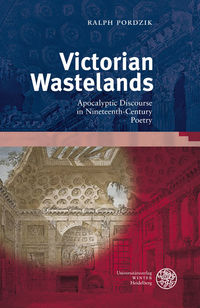
Victorian Wastelands
Apocalyptic Discourse in Nineteenth-Century Poetry
1. Edition, 2012
206 Pages
ISBN: 978-3-8253-5979-9
Product: Book
Edition: Hardcover
Subject: Anglistik/Amerikanistik
Series: Anglistische Forschungen, Volume No.: 423
Available: 17.01.2012
Keywords:
Browning, Robert, Viktorianismus, 19. Jahrhundert, Apokalypse, englische Literatur, Arnold, Matthew, Großstadtroman, Viktorianische Literatur, Krimkrieg, Ruinenliteratur, Alfred, Lord Tennyson, Rossetti, Christina, Victorian Studies, Apolkalyptik
It has long been a commonplace to argue that apocalyptic touched Victorian writers more profoundly than any other spiritual issue of the age. Doom and disaster seemed far more probable to them than any millennium, divine or earthly, they could imagine. This study attempts a short critical history of apocalyptic poetry written in the nineteenth century, arguing that Victorian poets gradually changed their view of the End and with it the literary forms in which it was to be explored and symbolized. In a series of transactions informed by scientific change and deeply affecting their aesthetic perception, they lost faith in the regenerating powers of myth and in the concept of the infinite according to which transcendence and cosmic transformation represented vital possibilities within a comforting spiritual vision of hope and renovation. The apocalyptic poem became a privileged site of negotiating the anxieties produced by continued economic and cultural revolution, incorporating memorable scenes of apocalypse or destruction on a cosmic scale but also leaving them tantalizingly unfinished at the threshold of a redeeming vision.
""
Philipp Erchinger in: Anglia, Bd. 131 (2011), Heft 2/3, 419ff
""
Paul Goetsch in: Literaturwissenschaftliches Jahrbuch, 55. Jg. (2014), 325ff
""
in: Reference and Research Book News, Vol. 28.5, Oct 2013, 214
""
Allan Weiss in: Zeitschrift für Fantastikforschung, 5 (2013), Heft 1, 128ff




